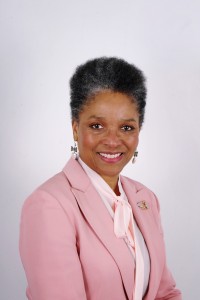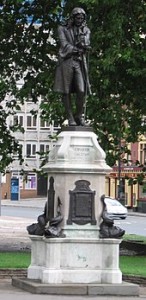Bristol’s businesses have a key role to play in creating a fairer and more just city, the Lord-Lieutenant for Bristol has said as the impact of last weekend’s toppling of the Edward Colston statue continue to be felt.
Peaches Golding OBE, pictured, said much had been achieved over the past two decades – but there was more to do. 
Bristol was a city of sanctuary where 92 languages were spoken and celebrated, she said. It was also a diverse and welcoming city.
But the link with slavery continued to haunt the city – and the statue of Edward Colston had been the “lightning rod for this uncomfortable legacy”.
She described the felling of the statue and its deposit in the Floating Harbour – which have created headlines across the world and sparked a national debate – as unlawful actions, and said they had diverted attention away the real issues.
Ms Golding was the first black woman in the UK to become a Lord-Lieutenant when she was appointed by the Queen to the historic role in 2017.
She said: “We have arrived at a new point. Today there is a greater awareness of how the racial divide drags down society as a whole.
“There is a willingness among the population as a whole to call out injustice, prejudice and racial hatred. More importantly, there are those in power that are willing to drive through change to make society better, fairer, more just and productive. We can all act to create a better society and it is imperative to so do.”
American-born Ms Golding, who has lived in Bristol for nearly 40 years and was formerly Bristol’s High Sheriff, has a high profile in business circles in the city, having served on a number of boards of public bodies and private sector organisations.
In 1996 she began a two decade-long period of working with HRH The Prince of Wales in Business in the Community to highlight the opportunities that greater access to employment, stronger communities, integrated supply chains and more visible leadership from black communities could bring to the country as a whole.
“Among the successes is increased portrayal of black people in corporate advertising and in the media, increased investment into black communities, a greater understanding among business leaders of diversity in the workplace, the benchmarking of businesses on how well they are doing to promote top talent and how this is being achieved and the greater numbers of educated, skilled, ambitious and capable black people in the workforce,” she said. 
Some in the city revered Edward Colston as a saint for his philanthropy, while others judged him to be the devil incarnate for his slaving, she said.
“These two diametrically opposed views create a palpable tension that reverberates through communities, highlighting different outcomes in education, employment, physical health, mental health and more,” she said.
“Individual and statistical evidence underlines how racial prejudice, racial inequality and institutional racism reduces life chances as well as life spans.”
The city’s leadership modelled racial diversity: Her Majesty’s Lord-Lieutenant, the elected mayor, head of the voluntary sector development agency, professionals, creatives and more are of black heritage. The University of Bristol has appointed a black historian as professor of slavery to investigate its links with the trans-Atlantic trade City Hall mentors and trains cohorts of talented, black managers in order to improve their prospects of promotion in a range of sectors, while a social enterprise mentors and encourages young people from disadvantaged backgrounds to elevate and broaden their career aspirations.
“The city swore in the most diverse group of magistrates ever, with one third being black or Asian, female or non-Christian,”she added.
“So why was the statue of Edward Colston unceremoniously torn down from its city centre plinth, dragged through the streets and thrown into the Floating Harbour?
“Why was the peaceful protest of many thousands of people, black and white, from Bristol and beyond, in support of ‘Black Lives Matter’ not the headline news in and across the country?
“The unlawful actions of a few have successfully highjacked our attention and are poised to stop us focusing on the real opportunities that are around us.”






























